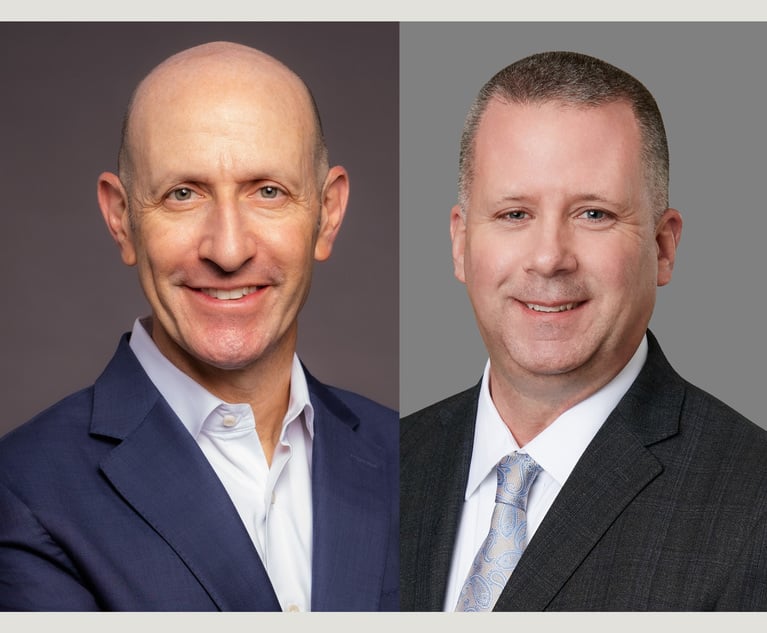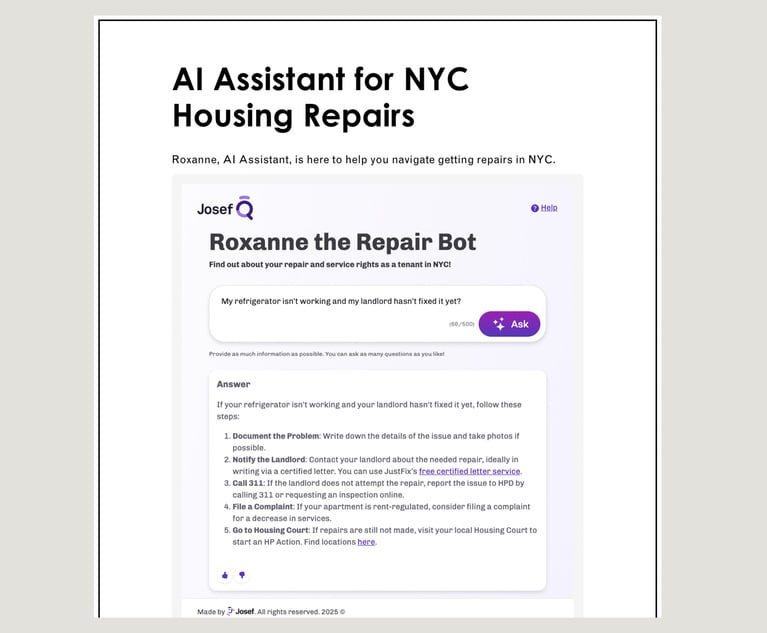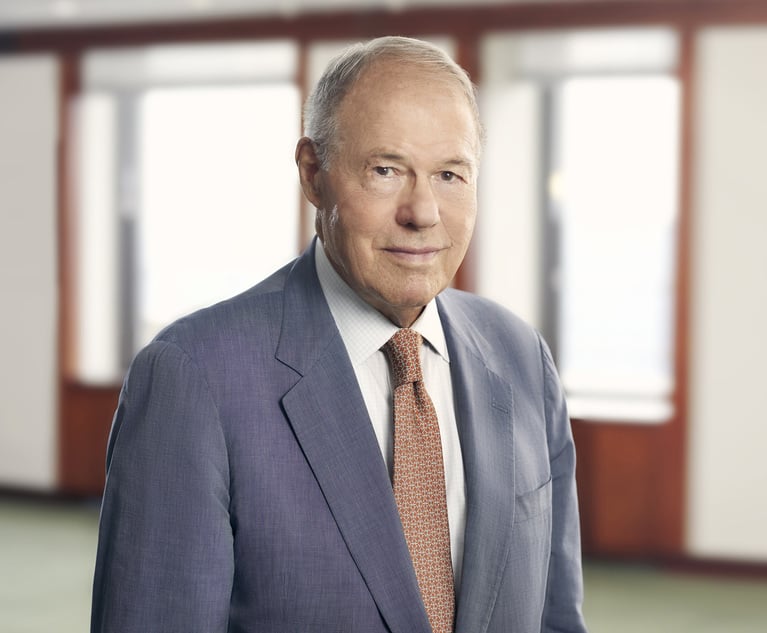EDNY Vet James Gatta Returns to Goodwin Procter
Gatta was most recently the chief of the Criminal Division of the Brooklyn U.S. Attorney's Office, serving as a prosecutor during a renaissance in the office's white-collar practice.
March 30, 2018 at 02:08 PM
8 minute read
 Photo Credit: Diego M. Radzinschi/ALM
Photo Credit: Diego M. Radzinschi/ALM
The storied sibling rivalry between the U.S. Attorneys' Offices in the Eastern and Southern District of New York can get overblown easily. There's no denying, though, there remains varying degrees of real competition between the two, sometimes fierce and even bitter, other times less so.
That's why the arrival of the Southern District's Criminal Division chief, Lisa Zornberg, at the recent farewell get together for her now-departed counterpart in the Criminal Division of the EDNY, James Gatta, was noteworthy. Those in attendance agreed that it was a testament to the respect Gatta as both prosecutor and individual earned during his decadelong stint in the Brooklyn office. As multiple sources confirmed, Zornberg's presence said it all: It's one thing to be liked and respected by those closest to you, but it's something special when your rival is there to fete you too.
Next week, Gatta will officially rejoin his old firm, Goodwin Procter, where his experience as both a prosecutor and a manager is seen as a huge new asset for the firm's white-collar practice, said Goodwin Procter partner Richard Strassberg, who heads the firm's white-collar practice.
“I think Jim is taking that to the next level for us,” he said.
Gatta will be the firm's sole Eastern District practitioner, according to Strassberg, but he stressed that, while this gives the firm a leg up in that jurisdiction, Gatta will be “one of the top counselors for companies and individuals who have to deal with the investigations that are going to be coming down the pike” from a much broader array of federal authorities than just the Brooklyn office.
“With his help, he's going to be a tremendous part of our growing the practice we have, but I think he's also going to grow himself into a sort of destination practice for people looking for white collar defense attorneys to help them navigate the minefield of investigations,” Strassberg said.
Strassberg has had a long view on Gatta's career. It was under his wing Gatta found himself after joining Goodwin in 2004 fresh off a clerkship with former U.S. Magistrate Judge Frank Maas. The two met during a reception held by Goodwin that happened to be the same night as a competing one held by Davis Polk & Wardwell.
“I thought to myself, look: I'm not getting a job at Davis Polk. I've never heard of this firm, why don't I just go over there,” he recalled.
It was, in his words, serendipitous. It wasn't just that Strassberg and Gatta's father, a career law man, both grew up in Oceanside on Long Island. Strassberg was making headlines representing Martha Stewart's stock broker, Peter Bacanovic. Before joining Goodwin, Strassberg himself had spent a decade as a federal prosecutor in the Southern District, where he rose to chief of the Major Crimes Unit.
“We just hit it off,” Gatta said.
While an associate, Gatta worked with Strassberg on the firm's high-profile cases, including the KPMG accounting scandal. Yet Gatta's focus on joining the prosecution never wavered. He was hired by the Eastern District in 2007.
“For me it was the job that I wanted the most. I dreamed of being a federal prosecutor,” Gatta said.
He rose quickly during Loretta Lynch's second tenure as head of the Brooklyn U.S. Attorney's Office, becoming chief of the public integrity section and deputy chief of the Criminal Division. When the previous chief of the Criminal Division, James McGovern, departed in 2016, Gatta was tapped to take over.
“For more than a decade, Jim was an excellent AUSA who made some of the most significant cases in the EDNY, and his passionate and unflappable leadership of the EDNY's Criminal Division will be sorely missed,” McGovern, now a partner at Hogan Lovells, said in a statement.
During his time in the office, the EDNY's white-collar criminal side entered a kind of golden age. The office's bread and butter has long been—and will continue to be—drugs and gangs, with a heavy dose of terrorism. But from local public corruption to international fraud such as the sprawling FIFA case, the EDNY's stature has risen to rival that of its sister office across the East River.
Gatta played a key role as member of the office's leadership team, according to Debevoise & Plimpton counsel Winston Paes, who left the EDNY in April of last year, where he was the chief of the business securities fraud section.
“Jim led by example. He was not a big rah-rah guy. He's someone who led by the way he practiced law—with integrity and a sense of fairness. His value system was what he tried to impart on others, and anyone who worked for Jim knew that and saw that,” Paes said.
Gatta attributes his perspective, in large part, to his experience as an associate at Goodwin.
“My mind was always open, and I attribute a lot of that to the fact that I knew what it was like to walk with that person into the U.S. Attorney's Office,” he said.
As a prosecutor, Gatta said he made a practice of “kicking the tires” on cases to make sure the theories and beliefs behind them were sound. As manager, when line assistants would bring him cases, he say he would “pressure-test their assumptions about that putative defendant.”
“I think it's really important for federal prosecutors to have represented defendants in a case,” he said. “You have an enormous responsibility to wield the investigative and prosecutorial power of the U.S. government.”
This respect for the authority the office wielded was a natural byproduct of Gatta's own humility and experience that made him “a prosecutor's prosecutor,” according to Amanda Hector, who served with and under Gatta before leaving the office in January 2017.
“He understood what it was like to be down in the trenches, and if there's ever someone who you want to be in the trenches with, Jim was it,” she said.
That's not always a skill set that translates to being a good manager, Hector, who serves as general counsel at an investment advisory firm, said. But in Gatta's case, “it really did.”
“He understood what it meant to be a great prosecutor, and he wanted to support everyone in doing that work. That was of the utmost importance to him,” she said.
Through it all, the “first, second and third priority was to do the right thing” in the Brooklyn office.
“I'm as proud of the cases we didn't bring as the ones that we did,” he said.
Leaving, then, was unsurprisingly difficult. The sense of family is absolute among members of the office. Goodwin held a unique position for him as a place where a similar sense of closeness and respect existed.
“There is an aspect here of coming home, to a place I care a lot about as well,” he said.
Cases, Gatta noted, are more complex than ever. Now, back in private practice, he sees his insight into the mind of the government, as well as his experience working with the top levels of the Justice Department and its law enforcement partners, as invaluable for clients in the challenges they'll face.
While litigators and companies have spent more than a year reading tea leaves for enforcement and regulatory shifts under the Trump administration, Gatta said no one should expect the foot to come off the gas on white-collar actions coming out of the offices of New York City's federal prosecutors.
“I expect to see the same level of intensity in the government's space, like on the [Foreign Corrupt Practices Act] and securities fraud, etc.,” he said.
He sees areas only lightly touched by government regulations, such as tech and social media technology and other emerging industries, as one of the next fronts for prosecutors.
“I think that those will be places where we as former federal prosecutors with an understanding of the regulatory and criminal landscape can provide value to our clients both here and abroad, to try and deal with how the U.S. is trying to wrap its arms around some of this stuff,” he said.
This content has been archived. It is available through our partners, LexisNexis® and Bloomberg Law.
To view this content, please continue to their sites.
Not a Lexis Subscriber?
Subscribe Now
Not a Bloomberg Law Subscriber?
Subscribe Now
NOT FOR REPRINT
© 2025 ALM Global, LLC, All Rights Reserved. Request academic re-use from www.copyright.com. All other uses, submit a request to [email protected]. For more information visit Asset & Logo Licensing.
You Might Like
View All
Meet the Long Island Judge Tapped to Be US Attorney for Eastern District of New York
2 minute read
New York’s Property Tax Incentives and Abatements Make Development Feasible
7 minute read
Josef Partners With NYU, Housing Court Answers to Launch AI Assistant Built for Tenants

Trending Stories
Who Got The Work
Michael G. Bongiorno, Andrew Scott Dulberg and Elizabeth E. Driscoll from Wilmer Cutler Pickering Hale and Dorr have stepped in to represent Symbotic Inc., an A.I.-enabled technology platform that focuses on increasing supply chain efficiency, and other defendants in a pending shareholder derivative lawsuit. The case, filed Oct. 2 in Massachusetts District Court by the Brown Law Firm on behalf of Stephen Austen, accuses certain officers and directors of misleading investors in regard to Symbotic's potential for margin growth by failing to disclose that the company was not equipped to timely deploy its systems or manage expenses through project delays. The case, assigned to U.S. District Judge Nathaniel M. Gorton, is 1:24-cv-12522, Austen v. Cohen et al.
Who Got The Work
Edmund Polubinski and Marie Killmond of Davis Polk & Wardwell have entered appearances for data platform software development company MongoDB and other defendants in a pending shareholder derivative lawsuit. The action, filed Oct. 7 in New York Southern District Court by the Brown Law Firm, accuses the company's directors and/or officers of falsely expressing confidence in the company’s restructuring of its sales incentive plan and downplaying the severity of decreases in its upfront commitments. The case is 1:24-cv-07594, Roy v. Ittycheria et al.
Who Got The Work
Amy O. Bruchs and Kurt F. Ellison of Michael Best & Friedrich have entered appearances for Epic Systems Corp. in a pending employment discrimination lawsuit. The suit was filed Sept. 7 in Wisconsin Western District Court by Levine Eisberner LLC and Siri & Glimstad on behalf of a project manager who claims that he was wrongfully terminated after applying for a religious exemption to the defendant's COVID-19 vaccine mandate. The case, assigned to U.S. Magistrate Judge Anita Marie Boor, is 3:24-cv-00630, Secker, Nathan v. Epic Systems Corporation.
Who Got The Work
David X. Sullivan, Thomas J. Finn and Gregory A. Hall from McCarter & English have entered appearances for Sunrun Installation Services in a pending civil rights lawsuit. The complaint was filed Sept. 4 in Connecticut District Court by attorney Robert M. Berke on behalf of former employee George Edward Steins, who was arrested and charged with employing an unregistered home improvement salesperson. The complaint alleges that had Sunrun informed the Connecticut Department of Consumer Protection that the plaintiff's employment had ended in 2017 and that he no longer held Sunrun's home improvement contractor license, he would not have been hit with charges, which were dismissed in May 2024. The case, assigned to U.S. District Judge Jeffrey A. Meyer, is 3:24-cv-01423, Steins v. Sunrun, Inc. et al.
Who Got The Work
Greenberg Traurig shareholder Joshua L. Raskin has entered an appearance for boohoo.com UK Ltd. in a pending patent infringement lawsuit. The suit, filed Sept. 3 in Texas Eastern District Court by Rozier Hardt McDonough on behalf of Alto Dynamics, asserts five patents related to an online shopping platform. The case, assigned to U.S. District Judge Rodney Gilstrap, is 2:24-cv-00719, Alto Dynamics, LLC v. boohoo.com UK Limited.
Featured Firms
Law Offices of Gary Martin Hays & Associates, P.C.
(470) 294-1674
Law Offices of Mark E. Salomone
(857) 444-6468
Smith & Hassler
(713) 739-1250






